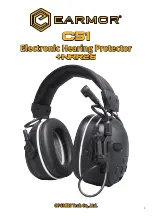
Absorbance Plate Test
|
73
Synergy HT Operator's Manual
Procedure: Gen5™
To run the Absorbance Plate Test using Gen5:
1.
In Gen5, select
System|Diagnostics|Test Plates|Run
.
2.
If prompted, select the desired
Test Plate
and click
OK.
3.
When the Absorbance Test Plate Options dialog appears, check
Perform
Peak Wavelength Test
if it is not already checked.
4.
Highlight the wavelength(s) to be included in this test.
•
Note:
You need to select only those wavelengths most appropriate for
your use of the reader.
5.
(Optional) Enter any
Comments
.
6.
Click
Start Test.
7.
Place the Test Plate in the microplate carrier so that well A1 is in the
left
rear
corner of the carrier (as you are facing the carrier).
8.
Click
OK
to run the test.
9.
When the test completes, the results report will appear. Scroll down
through the report; every result should show ‘PASS’. See page 78 for
information on results and troubleshooting tips in the event of failures.
•
A sample test report is shown on pages 76 and 77.
•
Gen5 stores the results in a database; they can be retrieved and printed
at any time. We recommend you print and save the report to document
that the test was performed.
Summary of Contents for Synergy HT
Page 1: ...Operator s Manual Multi Mode Microplate Reader Synergy HT ...
Page 2: ......
Page 22: ...xx Preface BioTek Instruments ...
Page 142: ...120 Chapter 4 Instrument Qualification BioTek Instruments Inc ...
Page 144: ...122 Chapter 4 Instrument Qualification BioTek Instruments Inc ...
Page 174: ...152 Chapter 5 Preventive Maintenance BioTek Instruments Inc ...
Page 186: ...164 Appendix B Computer Control BioTek Instruments Inc ...
Page 236: ...214 Appendix D Specifications BioTek Instruments Inc ...
Page 240: ...218 Appendix E Instrument Dimensions for Robotic Interface BioTek Instruments Inc ...
















































